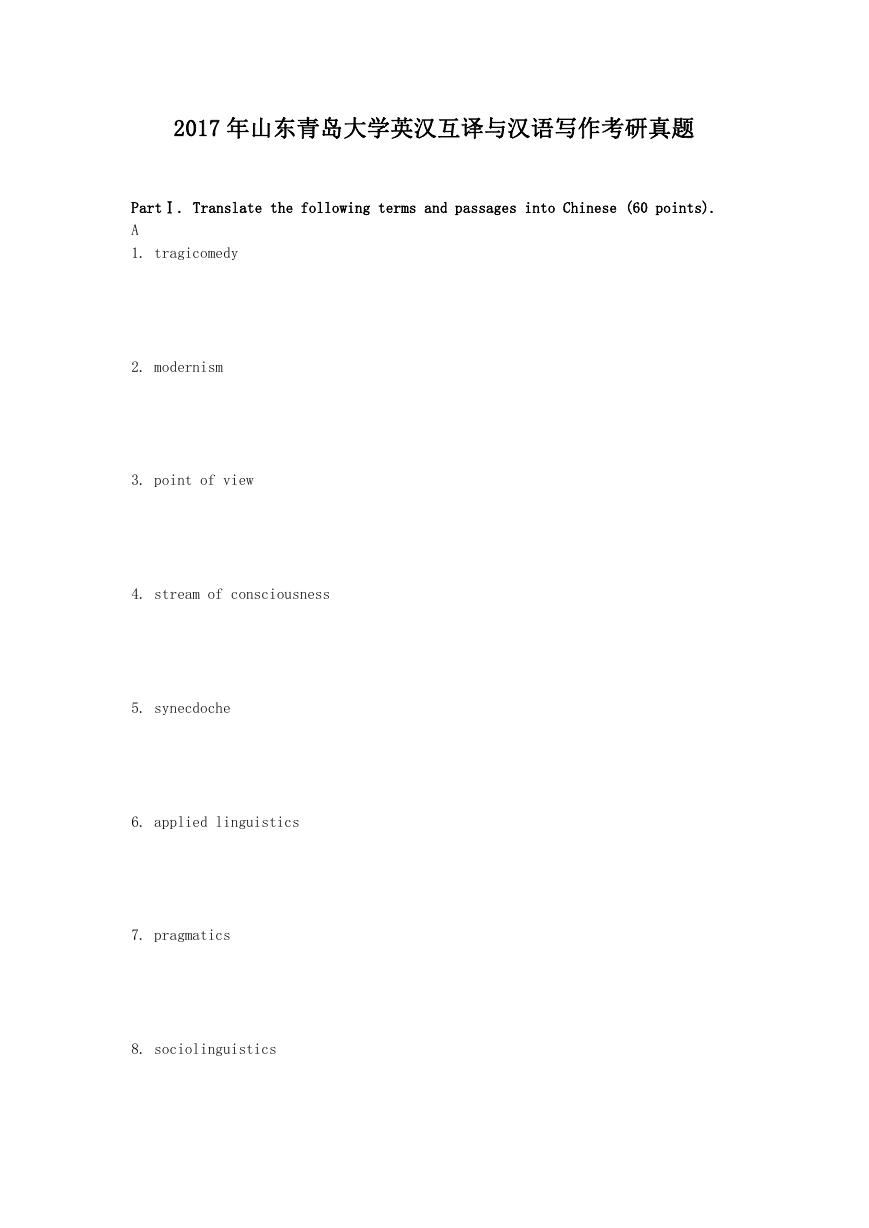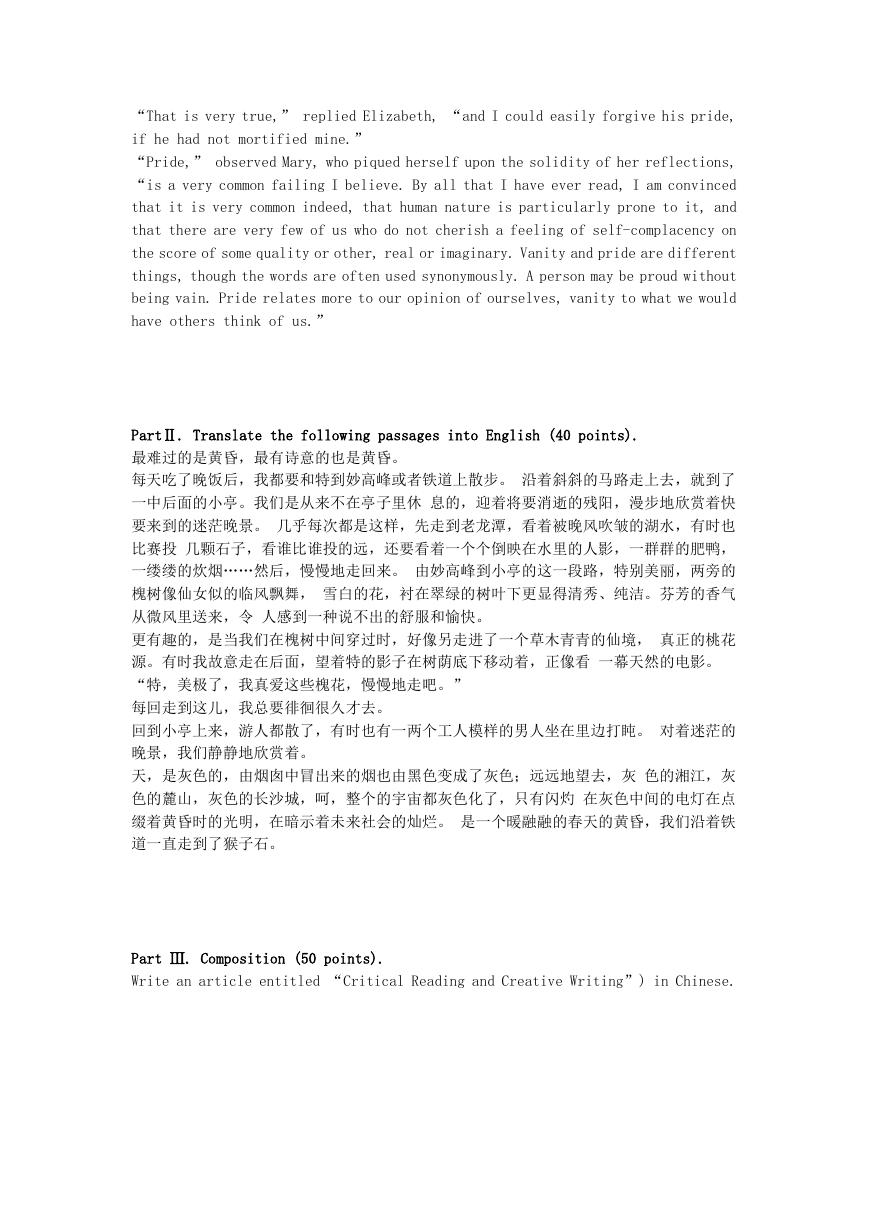2017 年山东青岛大学英汉互译与汉语写作考研真题
PartⅠ. Translate the following terms and passages into Chinese (60 points).
A
1. tragicomedy
2. modernism
3. point of view
4. stream of consciousness
5. synecdoche
6. applied linguistics
7. pragmatics
8. sociolinguistics
�
9. semantics
10.the informative function of language
B
Rhythm is sometimes quite easy. Beethoven’s Fifth Symphony, for instance, starts
with the rhythm “dididy dum”, which we can all hear and tap to. But the symphony
as a whole has also a rhythm---due mainly to the relation between its
movements---which some people can hear but no one can tap to. This second sort of
rhythm is difficult, and whether it is substantially the same as the first sort only
a musician could tell us. What a literary man wants to say, though, is that the first
kind of the rhythm, the dididy dum, can be found in certain novels and may give them
beauty. And the other rhythm, the difficult one---the rhythm of the Fifth Symphony
as a whole---I cannot quote you any parallels for that in fiction, yet it may be
present.
C
...There the meadows are all lawns with the lustrous green of spring even in
August, and often over-shadowed by old, fruit-trees - cherry, or apple, or pear;
and on Sunday after the rain there was an April glory and freshness added to the
quiet of the later summer.
Nowhere and never in the world can there have been a deeper peace; and the bells
from the little red church down by the river seemed to be the music of it, as the
song of birds is the music of spring. There one saw how beautiful the life of man
can be, and how men by the innocent labors of many generations can give to the earth
a beauty it has never known in its wildness. And all this peace, one knew, was
threatened; and the threat came into one's mind as if it were a soundless message
from over the great eastward plain; and with it the beauty seemed unsubstantial and
strange, as if it were sinking away into the past, as if it were only a memory of
childhood.
D
�
“That is very true,” replied Elizabeth, “and I could easily forgive his pride,
if he had not mortified mine.”
“Pride,” observed Mary, who piqued herself upon the solidity of her reflections,
“is a very common failing I believe. By all that I have ever read, I am convinced
that it is very common indeed, that human nature is particularly prone to it, and
that there are very few of us who do not cherish a feeling of self-complacency on
the score of some quality or other, real or imaginary. Vanity and pride are different
things, though the words are often used synonymously. A person may be proud without
being vain. Pride relates more to our opinion of ourselves, vanity to what we would
have others think of us.”
PartⅡ. Translate the following passages into English (40 points).
最难过的是黄昏,最有诗意的也是黄昏。
每天吃了晚饭后,我都要和特到妙高峰或者铁道上散步。 沿着斜斜的马路走上去,就到了
一中后面的小亭。我们是从来不在亭子里休 息的,迎着将要消逝的残阳,漫步地欣赏着快
要来到的迷茫晚景。 几乎每次都是这样,先走到老龙潭,看着被晚风吹皱的湖水,有时也
比赛投 几颗石子,看谁比谁投的远,还要看着一个个倒映在水里的人影,一群群的肥鸭,
一缕缕的炊烟……然后,慢慢地走回来。 由妙高峰到小亭的这一段路,特别美丽,两旁的
槐树像仙女似的临风飘舞, 雪白的花,衬在翠绿的树叶下更显得清秀、纯洁。芬芳的香气
从微风里送来,令 人感到一种说不出的舒服和愉快。
更有趣的,是当我们在槐树中间穿过时,好像另走进了一个草木青青的仙境, 真正的桃花
源。有时我故意走在后面,望着特的影子在树荫底下移动着,正像看 一幕天然的电影。
“特,美极了,我真爱这些槐花,慢慢地走吧。”
每回走到这儿,我总要徘徊很久才去。
回到小亭上来,游人都散了,有时也有一两个工人模样的男人坐在里边打盹。 对着迷茫的
晚景,我们静静地欣赏着。
天,是灰色的,由烟囱中冒出来的烟也由黑色变成了灰色;远远地望去,灰 色的湘江,灰
色的麓山,灰色的长沙城,呵,整个的宇宙都灰色化了,只有闪灼 在灰色中间的电灯在点
缀着黄昏时的光明,在暗示着未来社会的灿烂。 是一个暖融融的春天的黄昏,我们沿着铁
道一直走到了猴子石。
Part Ⅲ. Composition (50 points).
Write an article entitled “Critical Reading and Creative Writing”) in Chinese.
�






 2023年江西萍乡中考道德与法治真题及答案.doc
2023年江西萍乡中考道德与法治真题及答案.doc 2012年重庆南川中考生物真题及答案.doc
2012年重庆南川中考生物真题及答案.doc 2013年江西师范大学地理学综合及文艺理论基础考研真题.doc
2013年江西师范大学地理学综合及文艺理论基础考研真题.doc 2020年四川甘孜小升初语文真题及答案I卷.doc
2020年四川甘孜小升初语文真题及答案I卷.doc 2020年注册岩土工程师专业基础考试真题及答案.doc
2020年注册岩土工程师专业基础考试真题及答案.doc 2023-2024学年福建省厦门市九年级上学期数学月考试题及答案.doc
2023-2024学年福建省厦门市九年级上学期数学月考试题及答案.doc 2021-2022学年辽宁省沈阳市大东区九年级上学期语文期末试题及答案.doc
2021-2022学年辽宁省沈阳市大东区九年级上学期语文期末试题及答案.doc 2022-2023学年北京东城区初三第一学期物理期末试卷及答案.doc
2022-2023学年北京东城区初三第一学期物理期末试卷及答案.doc 2018上半年江西教师资格初中地理学科知识与教学能力真题及答案.doc
2018上半年江西教师资格初中地理学科知识与教学能力真题及答案.doc 2012年河北国家公务员申论考试真题及答案-省级.doc
2012年河北国家公务员申论考试真题及答案-省级.doc 2020-2021学年江苏省扬州市江都区邵樊片九年级上学期数学第一次质量检测试题及答案.doc
2020-2021学年江苏省扬州市江都区邵樊片九年级上学期数学第一次质量检测试题及答案.doc 2022下半年黑龙江教师资格证中学综合素质真题及答案.doc
2022下半年黑龙江教师资格证中学综合素质真题及答案.doc